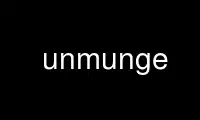
This is the command unmunge that can be run in the OnWorks free hosting provider using one of our multiple free online workstations such as Ubuntu Online, Fedora Online, Windows online emulator or MAC OS online emulator
PROGRAM:
NAME
unmunge - MUNGE credential decoder
SYNOPSIS
unmunge [OPTION]...
DESCRIPTION
The unmunge program validates a MUNGE credential (e.g., one created by the munge program).
By default, the credential is read from stdin and the metadata and payload are written to
stdout. When the metadata and payload are written to the same stream, they are separated
by a blank line.
OPTIONS
-h, --help
Display a summary of the command-line options.
-L, --license
Display license information.
-V, --version
Display version information.
-i, --input file
Input the credential from the specified file.
-n, --no-output
Discard all output.
-m, --metadata file
Output metadata to the specified file.
-o, --output file
Output the payload to the specified file.
-k, --keys string
Specify a subset of metadata keys to output. The keys are case-insensitive and
delimited by whitespace, commas, semicolons, or periods -- as long as the string is
treated as a single argument by the shell (e.g., enclosed by quotes). If a subset
is not specified, all available keys are selected by default.
-K, --list-keys
Display a list of metadata keys.
-S, --socket path
Specify the local domain socket for connecting with munged.
METADATA KEYS
The following metadata keys are supported.
STATUS The status of the credential decode operation.
ENCODE_HOST
The address of the host on which the credential was encoded.
ENCODE_TIME
The time at which the credential was encoded (according to the local clock of the
host that encoded it).
DECODE_TIME
The time at which the credential was decoded (according to the local clock of the
host that decoded it).
TTL The time-to-live value (in seconds) placed within the credential.
CIPHER The cipher type used to encode the credential.
MAC The MAC type used to encode the credential.
ZIP The compression type used to encode the credential.
UID The user ID of the process that encoded the credential.
GID The group ID of the process that encoded the credential.
UID_RESTRICTION
The user ID restriction placed within the credential.
GID_RESTRICTION
The group ID restriction placed within the credential.
LENGTH The length (in bytes) of the payload.
EXIT STATUS
The unmunge program returns an exit code corresponding to the return code of
munge_decode(). On success, it returns a zero exit code which signifies the credential is
valid. On error, it prints an error message to stderr and returns a non-zero exit code.
Use unmunge online using onworks.net services
